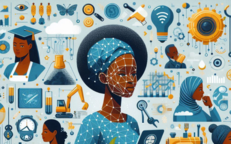Empowering Women's Political Participation Through The Adoption Of Gender-Responsive Innovative Technologies
This is the 23rd post in a blog series to be published in 2023 by the APET Secretariat on behalf of the AU High-Level Panel on Emerging Technologies (APET)
Aspiration 6 of the African Union’s Agenda 2063 envisions a future in Africa driven by its people, harnessing the potential of its citizens, with a special emphasis on its women and youth. Acknowledging the pivotal role that women play in advancing comprehensive development, Article 3 of the Protocol on Amendments of the African Union’s Constitutive Act mandates the AU to guarantee the active involvement of women in decision-making, particularly in politics, economics, and socio-culture.[1] Additional frameworks within the AU that champion women’s rights encompass Gender Equality and Women’s Empowerment (GEWE), as well as the AU’s African Charter on Human and Peoples' Rights on the Rights of Women in Africa. These initiatives collectively aim to ensure the full integration of women into Africa’s development agenda.
In numerous African countries, politics wields a significant influence over and shapes the decision-making process that impacts people’s lives. Furthermore, it determines the distribution of resources, thus shaping a country’s developmental trajectory. The foundation of human rights is intertwined with politics, which also establishes the boundaries for morality and ethics. Without political structures, individuals would lack a solid framework and understanding of their rights as integral members of a nation or community, potentially leading to violations of human rights. People can acquaint themselves with their rights within the political and social sphere through legal documents and political agreements that outline these fundamental rights.[2]
Consequently, achieving the goals of AU-2063 requires the equitable participation of women in political and leadership roles. The complete and active involvement of women in legislative bodies, alongside men, is not solely an objective, but also a pivotal element for the establishment and sustenance of democratic systems. Women's equal representation, leadership, and perspectives in parliaments, for example, play a vital role in ensuring heightened responsiveness to the concerns of citizens.
Throughout history, women have faced limited opportunities for political engagement and participation. The aim of most African governments to achieve a 50% representation of females in politics across all tiers of government remains a considerable challenge, as stipulated by the 2008 Protocol on Gender and Development, which has been ratified by most African countries. Presently, women comprise merely 24% of the 12,113 parliamentarians on the continent, with 25% representation in lower houses and 20% in upper houses of parliaments.[3]
What are the issues? Numerous factors hinder women’s entry into the political space. Often, women encounter unfavourable or even antagonistic political landscapes. Specifically concerning participation in politics and governance, some women suffer from various forms of harassment and abuse, which tend to be overlooked and underrepresented in dialogues. Within Africa, political parties contribute to a lack of political determination due to their exclusive focus on winning elections and solidifying their authority and tend to involve exclusion of women’s participation. These factors shake women's confidence in their ability and available opportunities to partake in political processes.
The African Union High-Level Panel on Emerging Technologies (APET) suggests that technological progress across the African continent presents an opportunity to attain equitable representation of women in political roles. Within the political realm, access to information holds immense significance. For example, the expansion of the internet and social media has granted women greater access to information, enabling them to remain informed about laws, candidates, and subjects directly impacting them. As such, digital platforms provide women with spaces to educate themselves, form informed viewpoints, and actively participate in political discussions.
Furthermore, APET encourages African women to leverage the prevalence of social media platforms to advance their political agendas. Social media has emerged as a potent tool for women to share their narratives, articulate their ideas, and amplify awareness of their challenges. Unrestricted by physical boundaries, women can orchestrate campaigns, initiate virtual communities, and deliberate on policy matters. Particularly, artificial intelligence (AI) introduces insights that can foster formulating more effective policies and strategies. Additionally by utilising data, women can craft evidence-based policies that address the specific obstacles faced by them and other marginalised groups. This data becomes a resource for female politicians to identify trends, gauge public sentiment, and make informed decisions.
Numerous instances demonstrate how social media and AI are being harnessed to empower women in the realm of politics in Africa. For instance, in Kenya, Mzalendo employs social media to establish connections between women and elected officials, fostering accountability. The platform serves as a space for women to voice their concerns and ideas, while also offering effective social media engagement training.[4] In Nigeria, SheVotes employs AI to sift through social media data and identify potential voters, leading to targeted voter education campaigns.[5] Additionally, in South Africa, Code for Africa is in the process of developing an AI-driven tool aimed at assisting women in tracking the progress of gender equality legislation. This tool scans parliamentary records to flag instances of discrimination against women, thereby, fostering transparency.[6] These examples underscore how social media and AI are instrumental in equipping women with political influence across Africa.
The technologies discussed above possess the potential to level the playing field and amplify women's voices within the political process.[7] Further exemplifying the empowerment of women in African countries and enterprises through social media and AI, Rwanda's Ministry of Gender and Family Promotion employs these platforms to raise awareness of women's rights and advocate for gender equality. In South Africa, the Women's Legal Centre utilises AI to monitor the advancement of gender equality cases within the legal system, enabling trends to be identified and reforms championed. Meanwhile, in Kenya, SheCodes Africa employs social media to impart coding skills to women to enhance their opportunities to take up leadership roles.
The above illustrations highlight how women in Africa are capitalising on emerging technologies for political advancement. While these tools can offer empowerment, it is important to acknowledge the potential risks, such as online security and harassment. Taking this into account, continued investment in these technologies, coupled with safeguard measures by government and private sector alike, can pave the way for meaningful change and amplified women’s voices within the political arena. APET asserts that while technology presents opportunities for enhancing women’s participation in leadership positions, it is also accompanied by challenges or potential risks. Awareness of these potential drawbacks is crucial, thereby emphasising the importance of responsible and gender sensitive use of emerging and innovative technologies to enhance women’s political participation.
Featured Bloggers – APET Secretariat
Aggrey Ambali
Justina Dugbazah
Barbara Glover
Bhekani Mbuli
Chifundo Kungade
Nhlawulo Shikwambane
[1] https://au.int/en/gender-equality-development
[2] https://openeducationonline.com/magazine/10-reasons-why-politics-are-important/
[3] https://www.idea.int/news-media/news/women%C2%B4s-political-participation-africa-barometer-2021
[4] https://mzalendo.com/media/resources/THE_INVISIBLE_MINORITY.pdf
[5] https://novafrica.org/research/voter-education-in-nigeria-mozambique-and-sao-tome-and-principe/
[6] https://www.parliament.gov.za/press-releases/sals-urged-use-legislative-and-oversight-mandate-gender-transformation
[7] https://www.oecd.org/development/gender-development/DEV_socialmedia-issuespaper-March2015.pdf


